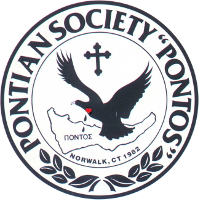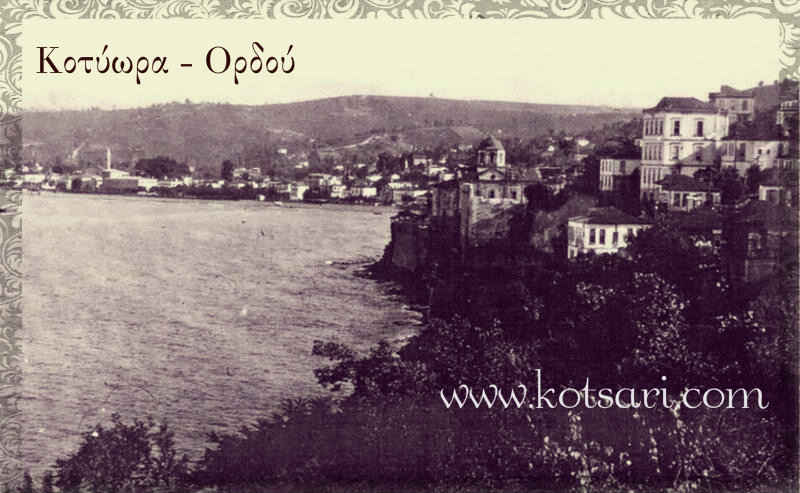It was Friday, August 11, 1917. From dawn, a darkness could still be seen in the background, which was soon growing. It was not long before we could clearly see the smoky chimneys of the Russian fleet, which in a short time reached the outskirts of the port and immediately started bombing. Romans and Turks (although we Romans begged and waited for them to come to save us from the sufferings of slavery), we scattered others to Poz tepen, others to the Basilica, others to the Pakhtzedes and others to Tapia and where else we think that we will be safe.

Out of habit, I left with my cousin in Poz Tepe, our hazelnut, from where I could see all the places that were bombed. After several hours of bombing, I see one of the warships approaching just above the grand staircase and landing with steamy army expats on land. I could not believe my eyes and I cried unconsciously, I remember it like today,: Long live Greece !!!, as if it were the Greek Fleet. Unrestrained with enthusiasm, I shouted at my cousin, who was hiding in a puddle at the time, as a Russian plane was flying over us, saying: the Russians are occupying the city. We immediately ran downstairs, passed in front of our locked houses and went to the beach where all the Christian population had gathered. I can not describe what was happening. All those people were running up and down to find their own as in the bombings the mother had literally lost the child and the child the mother as the saying goes. You hear tearing voices. Manades (greek word for mother) shouting the names of their children and children crying shouting: mother-mother where are you? You saw all those people crammed into the dilapidated staircase and pushed to get into the steam room. Men and young children jumped into the sea in their clothes to reach the crowded boats. You saw fathers with sad faces and incessant crying parting with their own and leaving alone an hour earlier as they were fugitives. I still remember the first creepy issues of my life. The corpse of the blessed Rouda Moskov, mother of the brothers Kostas and Iraklis, who were pushed by the waves sometimes in and sometimes out on the beach. Nobody paid attention to her, nobody cared how the woman was killed or drowned. The feeling of self-preservation made people look and take care only of themselves as none of us knew if the city at that time belonged to the Turks or the Russians and who would eventually manage to prevail. This explains the fact that everyone was trying in every way to save themselves and escape with the few boats that existed. But the drama continued. Here is my personal story. After many searches I found my mother and older brother. We ran up and down to find a boat to leave too. But there was no boat anywhere. Frustrated and exhausted by the sight of the ships leaving, we decided to return home. So we took the road to the beach and saw on the small staircase a boat full of people ready to set sail. I do not remember if I said anything to my mother other than these: “I go to my father … mother” and I left. When I reached the stairs, when I was in the boat … I do not know. I only know that when the boat started in a few minutes, I saw my mother crying and shouting at me: “Greetings to your father (my father had gone to Bessarabia before the war where he remained)”. I do not know why my mother did not stop me, maybe she did not feel the immediate separation, maybe she wanted to save me at least. One thing is for sure, however, that I left so that I would never return to my homeland. Our boat was old and had an alburo without sails. It had two oars while one was broken. But we were determined to continue our journey. We also had Papa-Miltiadis Tsomidis with his baby. As soon as we opened to the sea, in the middle of the distance, the other ships began to set sail. Our frustration was indescribable. If we went back there was a danger that we would be killed by the Turks who, discouraged by the departure of the Russian ships, went down to the city cursing and killing the Giaourides (as we later learned). Our position was tragic. But we did not despair as divine providence had done its miracle. While the former crowded boats were docked on ships carrying no other passengers, we were taken aback by the fact that the late Papa-Miltiadis, dressed as the races, stood up straight and raised his hands to the sky in prayer. A sailor signaled to us. We arrived at full speed and boarded the warship. We were right raki (greek word for exhausted) from fatigue and mental anguish. The next day we arrived in Trabzon.
Source: Λαζαρίδης Χ. Στέφανος – Ποντιακή εστία τεύχη 38-39ον
Source: kotsari.com

